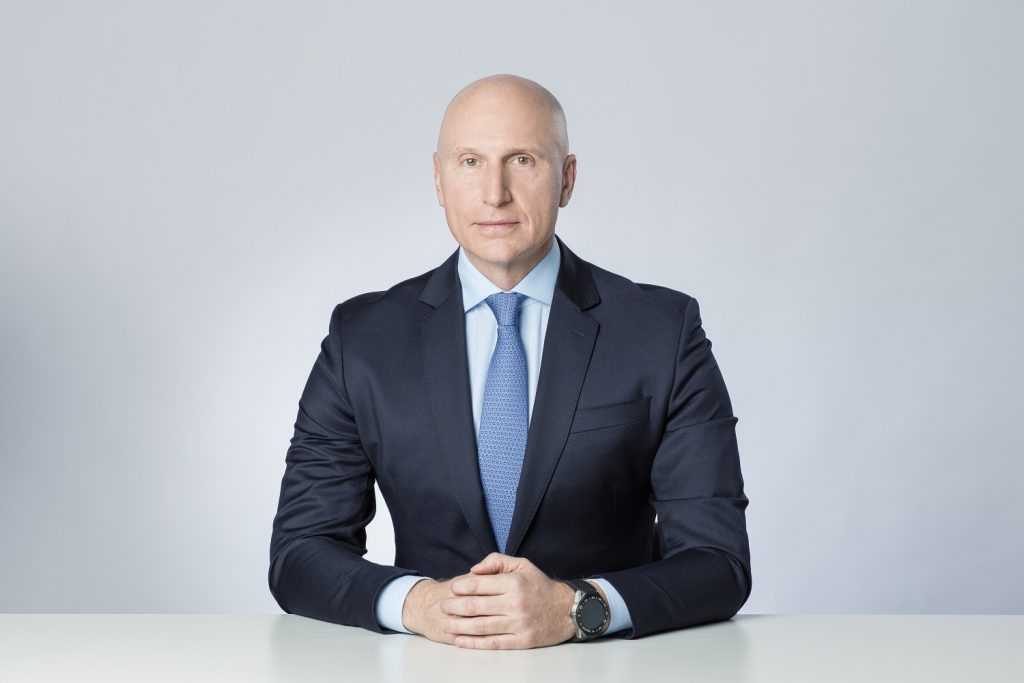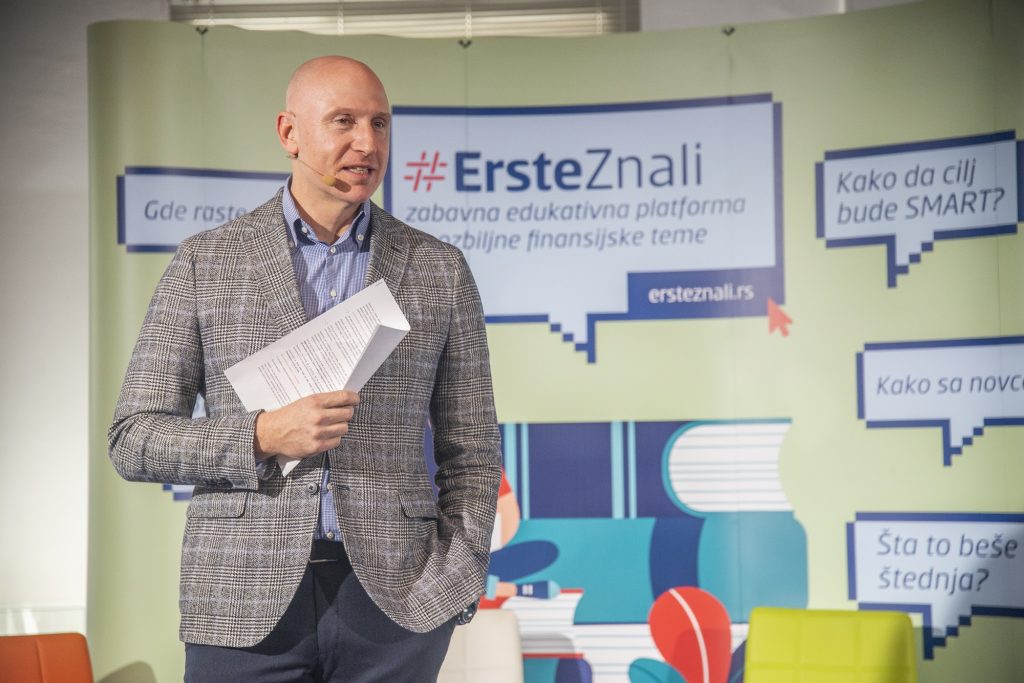Our high capitalization and liquidity, appropriate business model and excellent asset quality, as well as timely reactions to the negative consequences of the pandemic have proved that we are prepared to face the current situation
In an interview for the January issue of D&C magazine, Mr. Slavko Carić, Chairman of Erste Bank’s Executive Board, gives us an overview of the 2020 crisis and talks about challenges that await us in 2021. He also says that the pandemic has expedited digitalization and e-commerce, and talks about how Erste Bank has been supporting its clients.

The crisis has affected the entire world and no one was prepared. What consequences did the banking sector suffer from if you were to sum up the year 2020?
We are at the end of 2020 and we can say that our forecasts from the beginning of the pandemic-induced crisis proved to be correct. Although the pandemic has been officially lasting less than a year, a lot has happened in economic terms in the last few months, and it has been empirically confirmed that the banking sector is prepared for crisis scenarios. Liquidity and capital adequacy ratios of banks remain at an enviable level.
Namely, after the 2008 crisis, the banks have been preparing for the potential new crisis, and therefore, they entered the new crisis well-prepared and with a better initial position regarding the active inclusion in the development and implementation of the state support measures.
All the above also applies to Erste Bank which is a systematically significant bank in Serbia, as well as to the Erste Group, as one of the leading financial institutions in Central and Eastern Europe. Our high capitalization and liquidity, appropriate business model and excellent asset quality, as well as timely reactions to the negative consequences of the pandemic have proved that we are prepared to face the current situation.
Another very important thing is that we have also proved that our clients can count on us as a stable partner who will provide them adequate support.
I am really proud of all my colleagues and very grateful for their dedication, solidarity and effort to support our clients in the best possible manner
It seems that the crisis also has its benefits, as it has accelerated digitalization and e-commerce. How did Erste Bank organize its business and how did you maintain business and communication with your clients while ensuring that their banking is simple and safe in the current situation?
I will first focus on the aspect of digitalization, where we already had several key activities in March. We have already underlined the benefits of digital services even more to our clients, bearing in mind that they are a safer choice for their health. Very soon after the declaration of the state of emergency, we enabled the contracting and activation of the respective services without the need to visit the branch. This has proved to be a good practice, bearing in mind the increase in the client’s activity through online channels, as well as that the number of users of our digital services has increased significantly- by a fifth at the end of the third quarter in comparison to the end of the last year.
On the other hand, we have strengthened our service center capacities, since the clients needed timely support and financial advice in the conditions of financial uncertainty. During the state of emergency, we organized the delivery of new payment cards by mail and adjusted our daily operations in similar ways as we went along.
I am really proud of all my colleagues and very grateful for their dedication, solidarity and effort to support our clients in the best possible manner.
The needs and habits of people have also changed in this situation, which has affected the economy as well. How did you support the economy during the pandemic?
Our imperative during the entire period of the pandemic has been and remains the same – the preservation of business and jobs of our corporate clients, along with us, as an important support provider. From the very beginning of the crisis, we have constantly been communicating with them and we have been informed on their situation, whether they have new, different needs, and what challenges they are facing. We have been doing this to provide them adequate support.
In addition to the support under the auspices of the set of state measures, as well as everything included in the regular operation, we have decided to do something more for micro, small and social enterprises. Instead of advertising our own services and products, we have invested the funds intended for that purpose to support domestic companies. During the summer, we created and carried out a TV and online advertising support campaign which lasted a month and a half, and helped the general public find out about the respective companies and what they create.
Owing to the campaign, the visibility of their products and brands has increased, their sales have improved, and they have expanded and preserved their business. I also believe that this has enabled us to initiate and start “spinning” the virtuous circle of solidarity with the economy, which was also our objective. In addition to the active cooperation with the state institutions, the initiatives that we have established with the international financial institutions are highly important to us.
With the EBRD, we launched new credit lines in June for financing a wide range of SME needs. I am also proud that we are the first bank in Serbia with which the European Investment Bank has launched an important recovery program for companies that operate in the sectors that are most affected by the pandemic, such as transport, hotels, service industry, or retail and wholesale.
Moreover, we have recognized the needs of clients at the height of the pandemic and offered digital solutions for e-commerce, as well as the latest services on our market for simple and secure exchange and management of electronic documents, which will enable faster collection and liquidity, as well lower operative costs.
Much has been said about Serbia’s good result in regard to the national GDP this year. What challenges await the banking market and all of us in 2021?
The Serbian economy did show resilience, which mostly stems from its structure, as well as the high share that the industry of staple goods has in it. The record-breaking agricultural season has contributed as well, considering that agriculture accounts for almost eight percent of GDP, and support to the economy certainly comes from large investments in the public sector infrastructure, high lending growth, and the structure of the package of economic measures.
On the other hand, risks do exist and arise from the labour market, which depends on the state subsidies, as well as the potential slower recovery in the eurozone, our key trade partner. Our analysts evaluate the risks as balanced at the moment, and they predict a one percent drop this year, or a five percent growth next year, but with increased uncertainty.
Of course, now is not the best moment to give forecasts, bearing in mind the respective uncertainty of the situation and the fact that we do not know how long the pandemic will last. However, the recent announcements regarding vaccines are certainly encouraging.
Our economy’s recovery directly depends on the situation regarding the virus, the extent to which we will prevent its spread as a society, and whether the economy will have to be closed further. I believe in this important, yet simple correlation – observing the basic measures and wearing masks are really important for our faster economic recovery.
Erste Bank has been implementing a comprehensive financial education programme for over a year and a half. How important is our financial literacy, especially in the current situation? How do you educate clients?
I like to emphasize a fact that is often overlooked, and it is that financial literacy is becoming an increasingly important part of the general literacy of each of us. And this should be recognized as much as possible in every society. In many countries, it is gradually becoming a part of the educational system, which also proves its relevance.
In the current situation, it was important for many of us to make good financial decisions, since we have been planning and reconsidering finance management and changed our habits, maybe even more often than usual. We have also talked directly with the citizens about financial topics through a series of workshops, where we provided advice on important everyday issues, such as personal budget management and money management.
Education should begin at an early age. Special attention should be devoted to children, since the habits they acquire at an early age will help them make informed decisions for themselves and their family once they start earning and managing their money.
Guided precisely by this idea, Creative Centre published the book “Guardians of the Dragon’s Treasure”, which was written by our colleague Dragica Mujković, with the Bank supporting the book. The importance of the book was also recognized by the Ministry of Culture through its inclusion in the list of publications recommended to libraries in Serbia.
The reactions to the programme so far prove that we really are doing the right thing. We are actively working on innovating and expanding the programme, and you will learn more about it next year.
Before we offer them anything from a wide range of products and services, we always first properly check – what do the clients really need.
What innovations may be expected from Erste Bank in 2021?
First and foremost, our focus will remain on providing support to the economy and population in the crisis period, which we all hope will end soon. Moreover, we are working intensively and investing significant funds within the process of digital transformation, with a view to transitioning to the new Bank IT system. The state-of-the-art IT system will form an excellent basis for the development of even more modern and quality products and services.
However, in addition to innovations regarding even better, more innovative and flexible solutions for both the economy and population, in everything we do, we focus on the aspect that does not concern the digitalization and modernization of products itself. This refers to our advisory approach to clients and the complete experience they have in working with the bank. Hence, before we offer them anything from a wide range of products and services, we always first properly check – what do they really need, what is the best answer to their needs and what exactly do they want to achieve?
We will continue the intensive further development of our advisory approach and improvement of client experience, since our first and foremost goal is to be a partner who helps them make the best possible decisions for themselves and their financial health.

#ErsteZnali
In order to educate our clients, in March last year, we launched a comprehensive, free financial education programme called #ErsteZnali. The first activity was launching the ErsteZnali.rs online platform, which in one place, offers a carefully designed package of financial knowledge, entertaining texts on financial concepts, knowledge tests and business advice. We are constantly innovating and regularly adding new topics to the platform.